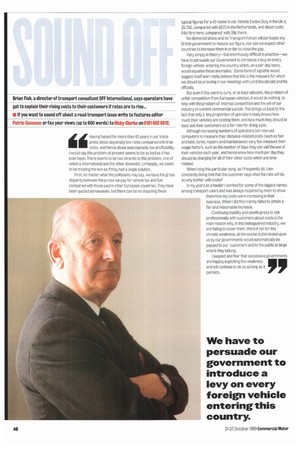Brian Fish, a director of transport consultant DFF International, says
Page 48

If you've noticed an error in this article please click here to report it so we can fix it.
operators have got to explain their rising costs to their customers if rates are to rise...
• If you want to sound off about a road transport issue write to features editor Patric NINON or fax your views (up to 600 words) to Micky Clarke on OM 862 8912.
6 Having fussed for more than 40 years in our trade
press about abysmally low rates compared with true costs, and hence about unacceptably low profitability, I would say this problem at present seems to be as bad as it has ever been. There seems to be two strands to this problem, one of which is international and the other domestic. Unhappily, we seem to be treating the two as if they had a single solution.
First, no matter what the politicians may say, we have the gross disparity between the prices we pay for vehicle tax and fuel compared with those paid in other European countries. They have been quoted ad nauseam, but there can be no disputing these typical figures for a 40-tonne truck: Vehicle Excise Duty in the UK is 25,750, compared with 2670 in the Netherlands, and diesel costs 64p/litre here, compared with 39p there.
No demonstrations and no Transport Forum will persuade any British government to reduce our figure, nor can we expect other countries to increase them in order to close the gap.
Very simply in theory—hut enormously difficult in practice—we have to persuade our Government to introduce a levy on every foreign vehicle entering this country which, on a per-day basis, would equalise these anomalies. Some form of vignette would suggest itself and I really believe that this is the measure for which we should be pressing in our meetings with Lord Macdonald and his officials.
But even if this were to cure, or at least alleviate, the problem of unfair competition from European vehicles, it would do nothing to help with the problem of internal competition and the will of our industry to commit commercial suicide. This brings us back to the fact that only a tiny proportion of operators really knows how much their vehicles are costing them, and how much they should at least ask their customers as a fair rate for doing ajob.
Although increasing numbers of operators can now use computers to measure their distance-related costs (such as fuel and lube, tyres, repairs and maintenance) very few measure their usage factors, such as the number of days they can sell the use of their vehicles each year, and hence know how much per day they should be charging for all of their other costs which are time related.
When I sing this particular song, as I frequently do, I am constantly being told that the customer says what the rate will be, so why bother with costs?
In my years as a haulier 1 worked for some of the biggest names among transport users and was always required by them to show them how my costs were increasing in their business. When I did this I rarely failed to obtain a fair and reasonable increase.
Continuing inability and unwillingness to talk professionally with customers about costs is the main reason why, in this beleaguered industry, we are failing to cover them. Were it not for this chronic weakness, all the excise duties levied upon us by our governments would automatically be passed to our customers and to the public at large where they belong.
I suspect and fear that successive governments are happily exploiting this weakness and will continue to do so as long as it persists.












































































































